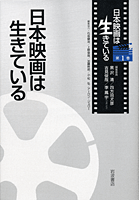Sounds a bit odd for the title of a post on a Japanese film blog, but this is actually the English translation of the title of a new book set published by Iwanami Shoten, one of Japan's preeminent scholarly publishers, that aims to account for the current state of Japanese film studies and point to future directions. While I am not a big fan of the title, I am actually on the editorial board of this set and submitted a couple of articles.
In some ways, Nihon eiga wa ikite iru 『日本映画は生きている』 is a successor to Koza Nihon eiga, the very important 8-volume set that Iwanami put out in the 1980s that represented some of the best film scholarship done in Japan at the time. The "koza" tradition is a long one in Japanese publishing. It literally refers to a lecture series, and in fact the first ones were just publishing the texts of lectures. It has now come to mean a coordinated scholarly introduction to core issues in a field. It's a big thing for a field to have a koza published by Iwanami, and it can often define the discipline.
Koza Nihon eiga was certainly important, but it came out right when academic film studies was only just building up steam in Japan, so it is an eclectic mix of scholarly essays, important interviews and memoirs, pseudo-research, and sometimes mistaken history. A new koza was needed, especially after nearly two decades had passed. Yomota Inuhuko spearheaded this effort, which actually began nearly a decade ago. I was there from the start, but unfortunately the state of film studies was such that the first publisher we approached did not jump on the bandwagon. The project was then shelved for a couple of years until Iwanami came on board. That publisher was supportive, but its concerns over sales led first to the current title and second to some changes in the editorial board. As with Koza Nihon eiga, which officially lists Imamura Shohei and Yamada Yoji as two of the main editors, some more famous, non-scholarly names such as those of the director Kurosawa Kiyoshi and the producer Lee Bong-U got credit as editors (henshu), while others (some of whom, it must be admitted, actually did much more work) ended up with the credit "cooperating editors" (henshu kyoryoku). Nothing personal against Kurosawa-san, who is a friend, but this does say something about the state of film studies in Japan. (I ended up with "cooperating editor" credit, but I probably deserved it.) The editorial staff ended up like this:
Editors: Kurosawa Kiyoshi, Yomota Inuhiko, Yoshimi Shun'ya, Lee Bong-U
Cooperating Editors: Ishizaka Kenji, Ueno Toshiya, Kato Mikiro, Komatsu Hiroshi, Aaron Gerow
Despite Iwanami's machinations, the resulting books are important. So far, two volumes have come out:
 Volume 1: Nihon eiga wa ikite iru 『日本映画は生きている
Volume 1: Nihon eiga wa ikite iru 『日本映画は生きている』. An overview of the field with contributions from people like Yomota, Lee, Abe Kasho (author of Beat Takeshi Vs. Takeshi Kitano
), Mori Tatsuya (A and A2
), Nakazato Isao, Miyao Daisuke (Sessue Hayakawa
), Itakura Fumiaki, and myself. My essay, which I had to write in English (and have translated by Tsunoda Takuya, a Yale grad student in Japanese film), is entitled "Nihon/eiga/riron," and takes up the tortured history of Japanese film theory by focusing on the contradictions Japanese thinkers have experienced in theorizing Japanese cinema (problems which stem from a tendency to place theory in the West and define Japanese film through the absence of theory).
Volume 6: Anime wa ekkyosuru 『アニメは越境する』. This volume was organized by Ueno-san, with contributions from Tsugata Nobuyuki, Tom Lamarre (The Anime Machine
), Tze-yue G. Hu (Frames of Anime
), Marc Steinberg, Ian Condry (Hip-Hop Japan
), Kamiyama Kenji, and Sato Dai (the latter two from Ghost in the Shell SAC
), amongst others.
There should be one or two volumes coming out each month until the set is complete. I have some other contributions in subsequent volumes.
I should note that the publisher Shinwasha has also been putting out its own set of volumes on film studies, Nihon eigashi sosho. While that is more a series of volumes than a coordinated koza, it is conducted by Iwamoto Kenji and features some excellent volumes. (I have a piece coming out in a forthcoming volume.) It reflects its editor as much as Nihon eiga wa ikite iru reflects Yomota. (For better or for worse, there are factions in Japanese film studies.)

